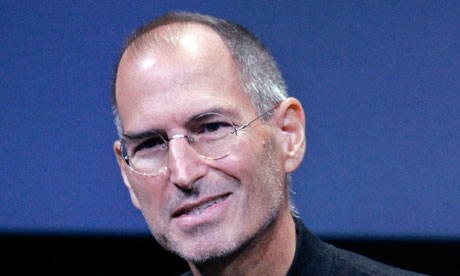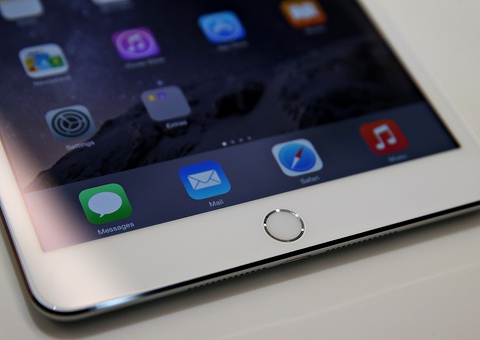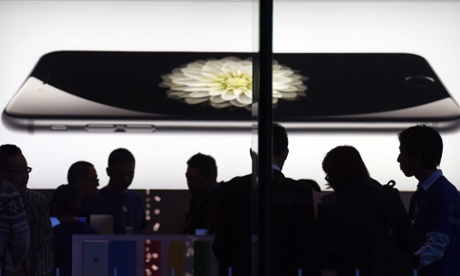Apple tonight reported record revenues for the second quarter in a row, with profits of $6bn and revenues of $26.74bn – up 77.5% and 70.5% respectively.
Shares had fallen at the start of today during early trading in New York, when stock markets reopened following Monday's holiday and investors digested the news that Apple's chief executive, Steve Jobs, was taking another open-ended period of medical leave. The break is his third since being diagnosed with a rare form of pancreatic cancer in 2004.
However, shares increased by 4% in after-hours trading, and the company announced that during the Christmas quarter it sold 7.3m iPads – as many as it sold in the previous two quarters – taking the total sold to 14.5m copies since its introduction in April. The iPhone also saw strong growth, with 16.24m sold in the most recent quarter – its best ever.
In a statement, Jobs said: "We had a phenomenal holiday quarter, with record Mac, iPhone and iPad sales. We are firing on all cylinders and we've got some exciting things in the pipeline for this year, including iPhone 4 on Verizon."
The results were announced after markets closed, with Apple's stock finishing the day down 2%, having earlier fallen by 4.1% to $334 in early trading.
Investors, meanwhile, are wondering about plans for a successor if Jobs is unable to return to the company, despite saying in his email to staff on Monday that he would continue as chief executive and be involved in major strategic decisions.
Tim Cook, the chief operations officer who stands in for Jobs during his absence, has been in the company since March 1998 and is viewed by Wall Street as a safe pair of hands. He ran the company for most of 2009 when Jobs received a liver transplant.
But questions are expected on whether Apple has enough new products and innovation in the pipeline to stimulate further growth. Though the iPad was designed and completed while Jobs was away, he is understood to have been closely involved in its development.
Richard Windsor, global technology specialist at Nomura, said: "Steve Jobs is seen by the market to be a major force in Apple's strategic direction. If his pancreatic cancer has returned, one could be quite worried."
Apple's market value means that shifts in its stock price can pull down or lift the market. "The market's reaction to Steve Jobs's surprise medical leave from Apple today will underscore the importance of the tech sector on the S&P 500 … What happens next to Apple will therefore dominate what happens in the sector," said Bryan McCormick, analyst at optionMonster.com.
Without new products, Apple's growth would likely stall: sales of the iPod – that led Apple's rapid growth in 2004 – are already in decline. Apple differs from Microsoft, which is able to rely on regular, substantial income from its Windows and Office monopolies to fund new ventures.
Despite the announcement about Jobs, analysts such as Kaufman Bros and Thinkequity raised their long-term forecasts for the share price, to $415 (up $10) and to $390 (up $15) respectively. Most analysts reckon the stock could still head towards $390, which would put it close to Exxon's world-leading $392bn market capitalisation.
Observers have focused on an apparent rivalry in the mobile market between Apple's iPhone and Google's Android mobile operating system. But the signs are that Android is not weakening Apple; instead the two are taking market share in the US, particularly from RIM, the Canadian maker of the BlackBerry. Apple passed RIM for the number of phones sold in the US in the third quarter, and RIM is struggling to maintain market share.
The iPhone, meanwhile, is expected to receive a sales boost in the US after Verizon, the largest US mobile network, with 93.2m subscribers, announced last week it would begin selling Apple's phones from the end of this month. That will be in addition to AT&T, with 89.8m subscribers, which has sold the device since its inception in June 2007.
In a conference call in 2009, Cook summed up Apple's strategy: "We believe we're on the face of the Earth to make great products, and that's not changing. We believe in saying no to thousands of projects so that we can really focus on the few that are truly important and meaningful to us … Frankly, we don't settle for anything less than excellence in every group in the company, and we have the self-honesty to admit when we're wrong and the courage to change. And I think, regardless of who is in what job, those values are so embedded in this company that Apple will do extremely well."
But questions remain over who would provide a strategic focus for the company without Jobs. The iPad and iPhone are viewed as being products of his vision. He is also seen as having been essential to the company's success, notably in negotiating contracts with content providers such as record labels and film companies.










